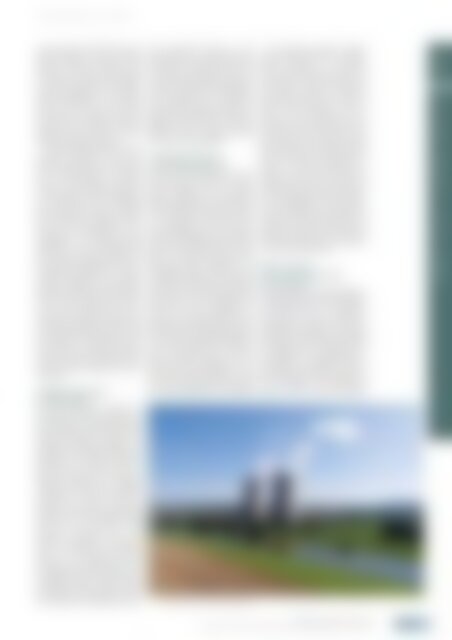atw - International Journal for Nuclear Power | 10.2020
Description Ever since its first issue in 1956, the atw – International Journal for Nuclear Power has been a publisher of specialist articles, background reports, interviews and news about developments and trends from all important sectors of nuclear energy, nuclear technology and the energy industry. Internationally current and competent, the professional journal atw is a valuable source of information. www.nucmag.com
Description
Ever since its first issue in 1956, the atw – International Journal for Nuclear Power has been a publisher of specialist articles, background reports, interviews and news about developments and trends from all important sectors of nuclear energy, nuclear technology and the energy industry. Internationally current and competent, the professional journal atw is a valuable source of information.
www.nucmag.com
You also want an ePaper? Increase the reach of your titles
YUMPU automatically turns print PDFs into web optimized ePapers that Google loves.
<strong>atw</strong> Vol. 65 (2020) | Issue 10 ı October<br />
representa tives of the UK, France, the<br />
Czech Republic, Hungary, Poland,<br />
Slovakia, Romania, Bulgaria and<br />
Slovenia have rejected the proposal<br />
in a meeting of the Permanent Representatives<br />
Com mittee (of member<br />
states) ( COREPER) on 11 December,<br />
because they feared that nuclear<br />
and natural gas projects would be<br />
excluded from sustainable financing<br />
despite the fact that they were not<br />
excluded explicitly in the text.<br />
On 14 December 2019 the Finnish<br />
Presidency presented a new compromise<br />
proposal which was agreed to<br />
by the representatives of member<br />
states on 16 December and representatives<br />
of the European Parliament<br />
on 17 December. In the compromise<br />
only solid fossil fuels are excluded<br />
from taxonomy by seeking to replace<br />
them with other technologies. Concerning<br />
the classification of other<br />
technologies, a technology-neutral<br />
approach is chosen in principle and<br />
the criterium of significant harm <strong>for</strong><br />
environmental policy goals or the environment<br />
is specified as to consider<br />
concrete significant and long-term<br />
damages instead of targeting the mere<br />
risk of such damages. The position<br />
of the German government was to<br />
criticize the compromise proposal of<br />
the Finnish presidency, because it did<br />
not rule out that nuclear power could<br />
be classified as ecologically sustainable<br />
which the German government<br />
wanted to achieve but failed to do so<br />
in the Council as happened already in<br />
September.<br />
Legislative decisions<br />
and delegations<br />
In January 2020 the Committee on<br />
Economic and Monetary Affairs and<br />
the Committee on the Environment,<br />
Public Health and Food Safety of the<br />
European Parliament adopted the<br />
compromise on the Establishment of a<br />
framework to facilitate sustainable<br />
investment, the Council did so in<br />
April. The plenary of the European<br />
Parliament adopted the regulation<br />
„Framework to facilitate sustainable<br />
investment“ in June. The fate of<br />
nuclear as sustainable or significantly<br />
harmful to the environment though<br />
will now lie in the hands of the<br />
European Commission who will<br />
decide on taxonomy and cooperates<br />
with a new Plat<strong>for</strong>m on sustainable<br />
finance to be appointed by the<br />
Commission and will be supported by<br />
the Member States Expert Group on<br />
sustainable finance which advises<br />
the Commission regarding the work of<br />
the Plat<strong>for</strong>m on sustainable finance.<br />
The Commission decides on the<br />
classi fication, i.e. the content of taxonomy<br />
and its development by the way<br />
of technical screening criteria and<br />
technical standards through delegated<br />
acts on the basis of the regulation.<br />
The Commission has to finish this<br />
process <strong>for</strong> the aspects contribution to<br />
climate change mitigation and do no<br />
significant harm till 31 December<br />
2020 in order <strong>for</strong> application of the<br />
rules from 1 January 2022.<br />
Stakeholder dialogue<br />
on sustainable finance<br />
Parallel to the legislative procedures<br />
the Commission organized a stakeholder<br />
dialogue on sustainable<br />
finance in March 2020 at the occasion<br />
of the publication of the final reports<br />
of the Technical Expert Group after<br />
the consultation in 2019, the Taxonomy<br />
Technical Report, the Technical<br />
Annex, the Usability guide <strong>for</strong> the EU<br />
green bond standard and the Handbook<br />
on Climate Benchmarks and<br />
benchmarks’ ESG disclosures. The<br />
stakeholder dialogue that took place<br />
as an online event due to the Covid-19<br />
restrictions had 15.000 participants<br />
from all over the EU and beyond. The<br />
TEG kept up the classification of<br />
nuclear as not being included in the<br />
taxonomy in the final report with the<br />
same arguments as in the preliminary<br />
report. In the stakeholder dialogue it<br />
was recommended by the TEG that<br />
while no drastic changes are to be<br />
expected from the finalization of the<br />
taxonomy by the Commission – such<br />
as e.g. the 100g/kWh CO 2 threshold<br />
<strong>for</strong> electricity generation technologies<br />
| NPP Grohnde. Source: PreussenElektra GmbH<br />
– the taxonomy should be supplemented<br />
with criteria <strong>for</strong> the so called<br />
brown taxonomy, i.e. economic<br />
activities that might be harmful to the<br />
environment to a certain degree but<br />
still could contribute to achieving<br />
sustainability goals. Such criteria as<br />
well as social objectives could be<br />
added by the Commission on the<br />
occasion of the regular revisions of the<br />
taxonomy that are supposed to take<br />
place every five years. Also, activities<br />
now considered as sustainable could<br />
fall out of taxo nomy if they would no<br />
longer be relevant. Specifically, on<br />
nuclear, it was stated from the TEG<br />
represen tatives that it is clearly low<br />
carbon, but that the DNSH evaluation<br />
is very challenging so that no evaluation<br />
was possible, but eventually an<br />
evaluation could be elaborated in the<br />
next year. The conclusion was that the<br />
chapter on nuclear is not closed and<br />
the TEG basically asked the Commission<br />
to take over the issue.<br />
Other activities<br />
of the Commission and<br />
EU institutions<br />
From 23 March to 20 April 2020 the<br />
Commission had a public consultation<br />
“Sustainable finance – EU classification<br />
system <strong>for</strong> green investments”<br />
(Delegated Act) and on 18 June, the<br />
day after the regulation was adopted<br />
by parliament, the Commission called<br />
<strong>for</strong> applications <strong>for</strong> participation in<br />
the Plat<strong>for</strong>m on sustainable finance.<br />
The plat<strong>for</strong>m is supposed to start in<br />
September 2020. On the sidelines of<br />
the sustainable finance/taxonomy<br />
debate in other areas of the larger<br />
ENERGY POLICY, ECONOMY AND LAW 483<br />
Energy Policy, Economy and Law<br />
Sustainable Finance Initiative of the EU and Taxonomy – How Green Is <strong>Nuclear</strong>? ı Nicolas Wendler

















